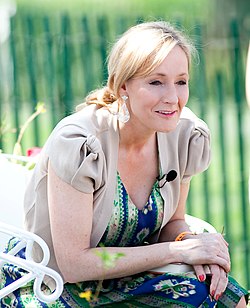J.K. Rowling Quote
TINA: I’ll have to go to the Ministry with what I’ve got.(a wobble in her voice) It was nice to see you again, Mr. Scamander.She strides from the room, leaving NEWT perplexed and upset.INT. FLAMEL HOUSE, HALLWAY—AFTERNOONJACOB follows TINA into the hall.JACOB: Hey, hold on one second, will you? Well, hold on! Wait! Tina!She leaves. As the front door closes, NEWT appears at the drawing room door.JACOB: (to NEWT)You didn’t mention salamanders, did you?NEWT: No, she just—ran. I don’t know . . .JACOB (firm): So you chase after her!NEWT grabs his case. He leaves.EXT. RUE DE MONTMORENCY—END OF DAYTINA is hurrying up the road. NEWT hastens to catch up.NEWT: Tina. Please, just listen to me—TINA: Mr. Scamander, I need to go talk to the Ministry—and I know how you feel about Aurors—NEWT: I may have been a little strong in the way that I expressed myself in that letter—TINA: What was the exact phrase? A bunch of careerist hypocrites?NEWT: I’m sorry, but I can’t admire people whose answer to everything that they fear or misunderstand is kill it!TINA: I’m an Auror and I don’t—NEWT: Yes, and that’s because you’ve gone middle head!TINA (stopping): Excuse me?NEWT: It’s an expression derived from the three heads of the Runespoor. The middle one is the visionary. Every Auror in Europe wants Credence dead—except you. You’ve gone middle head.A beat.TINA: Who else uses that expression, Mr. Scamander?NEWT considers.NEWT: I think it might just be me.
TINA: I’ll have to go to the Ministry with what I’ve got.(a wobble in her voice) It was nice to see you again, Mr. Scamander.She strides from the room, leaving NEWT perplexed and upset.INT. FLAMEL HOUSE, HALLWAY—AFTERNOONJACOB follows TINA into the hall.JACOB: Hey, hold on one second, will you? Well, hold on! Wait! Tina!She leaves. As the front door closes, NEWT appears at the drawing room door.JACOB: (to NEWT)You didn’t mention salamanders, did you?NEWT: No, she just—ran. I don’t know . . .JACOB (firm): So you chase after her!NEWT grabs his case. He leaves.EXT. RUE DE MONTMORENCY—END OF DAYTINA is hurrying up the road. NEWT hastens to catch up.NEWT: Tina. Please, just listen to me—TINA: Mr. Scamander, I need to go talk to the Ministry—and I know how you feel about Aurors—NEWT: I may have been a little strong in the way that I expressed myself in that letter—TINA: What was the exact phrase? A bunch of careerist hypocrites?NEWT: I’m sorry, but I can’t admire people whose answer to everything that they fear or misunderstand is kill it!TINA: I’m an Auror and I don’t—NEWT: Yes, and that’s because you’ve gone middle head!TINA (stopping): Excuse me?NEWT: It’s an expression derived from the three heads of the Runespoor. The middle one is the visionary. Every Auror in Europe wants Credence dead—except you. You’ve gone middle head.A beat.TINA: Who else uses that expression, Mr. Scamander?NEWT considers.NEWT: I think it might just be me.
Related Quotes
About J.K. Rowling
Born in Yate, Gloucestershire, Rowling was working as a researcher and bilingual secretary for Amnesty International in 1990 when she conceived the idea for the Harry Potter series. The seven-year period that followed saw the death of her mother, the birth of her first child, divorce from her first husband, and relative poverty until the first novel in the series, Harry Potter and the Philosopher's Stone, was published in 1997. Six sequels followed, concluding with Harry Potter and the Deathly Hallows (2007). By 2008, Forbes had named her the world's highest-paid author.
The novels follow a boy called Harry Potter as he attends Hogwarts (a school for wizards), and battles Lord Voldemort. Death and the divide between good and evil are the central themes of the series. Its influences include Bildungsroman (the coming-of-age genre), school stories, fairy tales, and Christian allegory. The series revived fantasy as a genre in the children's market, spawned a host of imitators, and inspired an active fandom. Critical reception has been more mixed. Many reviewers see Rowling's writing as conventional; some regard her portrayal of gender and social division as regressive. There were also religious debates over the Harry Potter series.
Rowling has won many accolades for her work. She was named to the Order of the British Empire and was appointed a member of the Order of the Companions of Honour for services to literature and philanthropy. Harry Potter brought her wealth and recognition, which she has used to advance philanthropic endeavours and political causes. She established the Volant Charitable Trust in 2000, and co-founded the charity Lumos in 2005. Rowling's philanthropy centres on medical causes and supporting at-risk women and children. In 2025, Forbes estimated that Rowling's charitable giving exceeded US$200 million. She has also donated to Britain's Labour Party, and opposed Scottish independence and Brexit.
Since 2020, Rowling has been vocal about her gender-critical views on transgender people and related civil rights. Her remarks have been described as transphobic, resulting in condemnation from various sectors and fuelling debates on freedom of speech. While Rowling denies being transphobic, her expression of these views has impacted her public image and relationship with readers and colleagues, altering the way they engage with her works.
